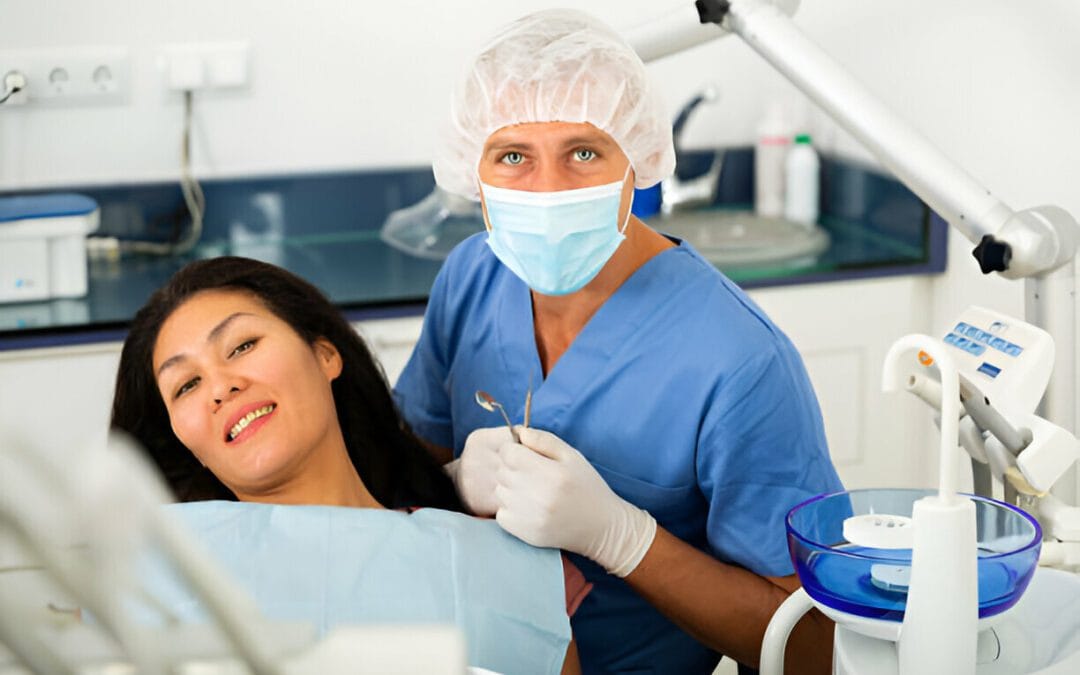For dental health, some situations need immediate attention. They are extreme dental emergencies. Recognizing these emergencies promptly ensures you get the right care quickly. It can stop more problems or even save a tooth.
Key Extreme Dental Emergencies Explained
Knocked-Out Tooth
A knocked-out tooth is one of the most urgent Dental emergencies. If you act quickly, ideally within an hour, there’s a chance to save the tooth. Carefully pick up the tooth by the crown (top part), rinse it without scrubbing, and try to place it back in its socket. If that’s not possible, keep it in a container of milk or a special dental preservation kit until you can get to a dentist.
Severe Infections and Abscesses
A severe infection or abscess in the mouth can be dangerous if not treated immediately. Signs include intense pain, swelling, fever, and a possible foul taste in your mouth. These infections can spread. They cause worse health issues. So, quick treatment is essential.
Uncontrolled Bleeding
Uncontrolled bleeding after an extraction or injury is a sign of an extreme dental emergency. If pressing a clean cloth or gauze to the area doesn’t stop the bleeding after 10 to 15 minutes, immediate medical attention is necessary.
Severe Pain and Swelling
Pain that quickly gets worse and is severe is a serious problem. This is especially true if it comes with swelling and fever. It can be life-threatening. This situation requires urgent attention to prevent the spread of infection.
What to Do If You Face an Extreme Dental Emergency
Immediate Actions to Take
Stay Calm: Keeping calm helps you handle the situation more effectively.
Call your dentist now. Most dentists have provisions for emergency calls. They will or direct you to an emergency service.
Manage Pain and Symptoms: Put cold compresses on swelling. Take over-the-counter pain relief to ease discomfort until you can see a professional.
Prevention: Better Safe Than Sorry
To avoid dental emergencies, always use mouthguards during sports. Also, avoid chewing hard things like ice or hard candies that could harm your teeth. And, practice careful oral hygiene to prevent infections. Regular dental exams are crucial. They can find and fix serious issues before they become emergencies.
Conclusion
Knowing what constitutes an extreme dental emergency and how to act can make a significant difference in outcomes. It’s a knocked-out tooth, severe infection, or uncontrolled bleeding. Quick action is key. Always remember, in dental emergencies, time is of the essence. Don’t hesitate; seek immediate dental or medical help to ensure the best possible care.By understanding these urgent conditions and preparing to act fast, you ensure that you or your loved ones get the care they need in critical times. Remember, timely intervention is key to handling extreme dental emergencies effectively.
Extreme Dental Emergencies: Your Urgent Care Solution
Encountering an extreme dental emergency can be distressing, but swift action is paramount. At Oldmachar Dental Care, we understand the urgency of such situations. Our experienced team is equipped to handle severe toothaches, knocked-out teeth, and other critical dental issues promptly and effectively.
Frequently Asked Question
What constitutes an extreme dental emergency?
A dental emergency is usually extreme. It involves severe pain, trauma, or bleeding in the mouth. It often needs urgent professional help to prevent more damage or stop pain.
Examples of extreme dental emergencies?
Extreme dental emergencies may include severe toothaches or knocked-out teeth. They can also include extensive oral bleeding, fractured jaws, or acute infections that cause swelling and fever.
How should one handle an extreme dental emergency?
Immediate action is vital. Contact a dentist or visit an emergency dental clinic promptly. Meanwhile, stop bleeding gently. Keep knocked-out teeth in milk or saliva. Manage pain with over-the-counter drugs if needed.
Why is prompt treatment crucial for extreme dental emergencies?
Timely intervention can stop permanent damage. It can also ease severe pain and lower the risk of problems. Delaying treatment may make the condition worse. This can lead to more procedures or long-term problems.
Can extreme dental emergencies be prevented?
While some emergencies are unforeseeable. But, good oral hygiene helps. Using protective gear during sports or high-risk activities also helps. Attending dental check-ups can greatly lower the risk of extreme dental emergencies.
For more information visit:https://oldmachardental.co.uk/emergency/

